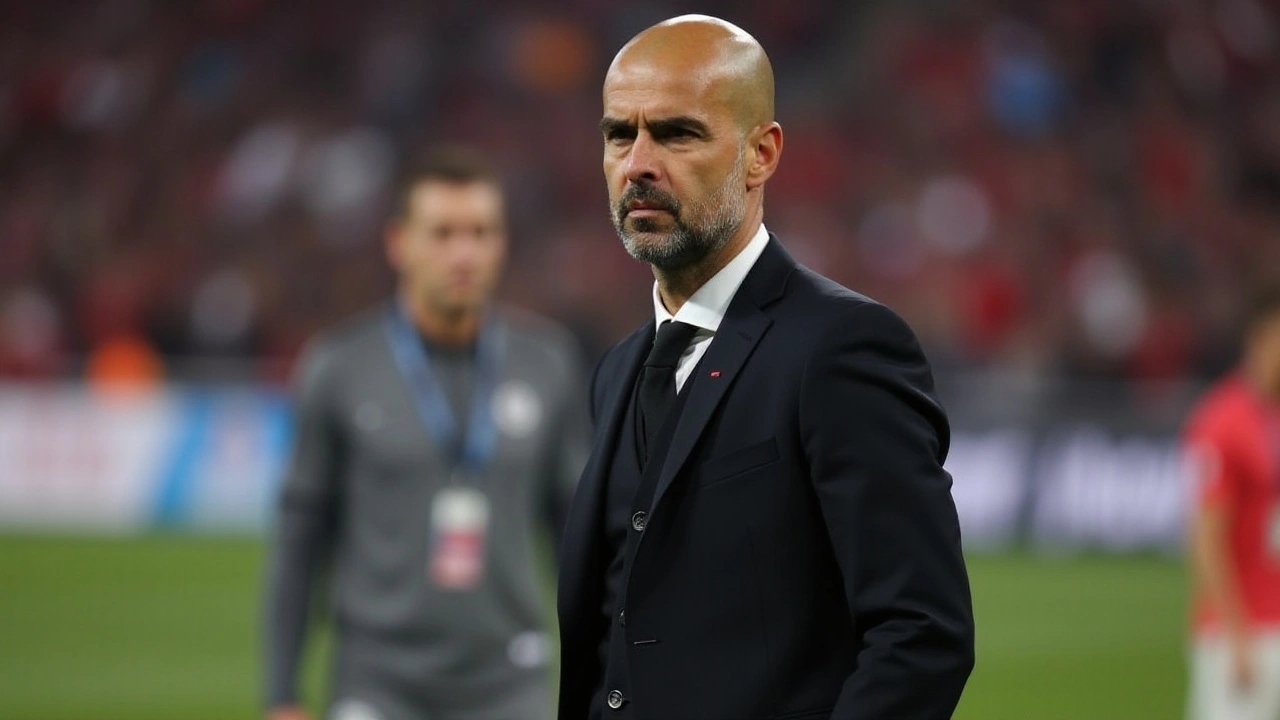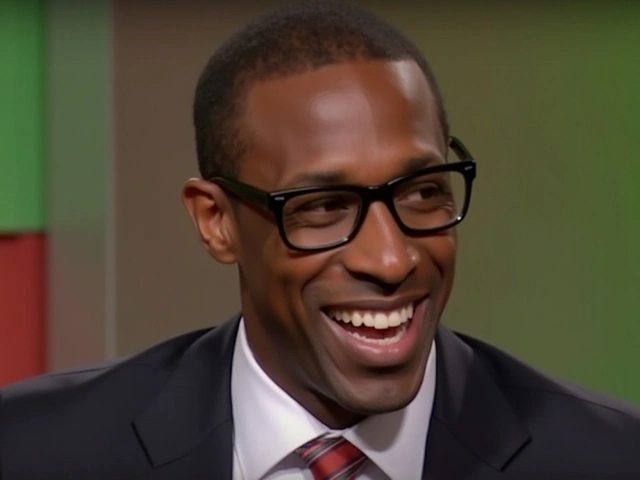Pep Guardiola: A Catalyst for Change in English Football?
In recent days, the football world has been abuzz with speculation about one of its most successful managers, Pep Guardiola, potentially taking the reins as the England national team manager. With the capacity to evoke hope and excitement amongst England's legion of fans, Guardiola's possible induction coincides with the end of his current contract at Manchester City next summer. While the ultimate decision remains cloaked in uncertainty, the possibility of Guardiola stepping into this pivotal role has undoubtedly set imaginations alight. Delving deep into the inner workings of this potential transition, several factors emerge, each holding the key to shaping the future of English football.
Guardiola, known for his tactical genius and transformative leadership, has carved an enviable niche in football management. His profound understanding of the English Premier League through his time at City further solidifies his candidacy as England manager. The Football Association (FA) appears to recognize his potential impact, reportedly setting its sights on bringing him on board. Therefore, any potential move is not just about hiring a manager; it's a strategic attempt to bring about seismic shifts in the country's football landscape. But hiring Guardiola isn't as simple as it sounds.
While Guardiola has not yet committed to any future projects beyond his current managerial stint at Manchester City, he offered a glimmer of possibility with his enigmatic statement: 'anything can happen.' He truly leaves his options open. The FA must consider that despite his numerous accomplishments, from harvesting trophies to instilling a legacy of top-notch football, Guardiola's journey with City has its share of turbulence. The club is entangled in a legal battle with the Premier League over allegations of financial breaches, potentially clouding Guardiola's future. His pride for managing established teams capable of global domination — like Barcelona and Bayern Munich — aligns comfortably with the aspirations of England's national team.
Financial Implications and Career Fatigue
Economic considerations always loom large in high-profile transitions such as this. As reports suggest, Pep Guardiola earns a considerable salary at Manchester City — a striking four times the amount the FA previously allocated for the salary of England's former manager Gareth Southgate. Football careers, however illuminating, are driven by financial motivations alongside ambition. Specifically, will Guardiola willingly take a significant pay cut, or would the FA consider adjusting their financial approach to accommodate his worth? These questions remain unanswered. Alongside financial deliberations, Guardiola's career fatigue could also play a decisive role. Having dedicated nine intense years to the City cause, would he crave new challenges, or opt for a breather away from the high-pressure spotlight?
A Tight Timeline for Decision
Timing, as they say, is everything, and in Guardiola’s case, the ticking clock adds additional pressure. The roadmap to the 2026 World Cup qualification soon commences, demanding clarity in leadership for the England national team. Should Guardiola decide in the coming weeks to part ways with Manchester City, the FA needs to act promptly to secure his expertise. Any delay could potentially derail England's preparation plans. Other managerial names circulate within these conversations, with Thomas Tuchel, former manager at Chelsea and Paris Saint-Germain, tagged as a front-runner. Additionally, Lee Carsley, serving as interim manager, seeks permanence; however, his tenure marred by a loss against Greece sends mixed signals about his standing.
The speculation doesn't just heat up discussions in football forums but reflects a broader narrative of what transformation this sport, often termed 'the beautiful game', might undergo with Guardiola steering its forward course. The inherent beauty of speculations is how they remain lively with endless possibilities until they solidify into reality.
Thus, the potential appointment of Pep Guardiola as the England national team manager is more than mere change—it is a promise of possible renaissance within the sport. And should the stars indeed align, England might embark on a new competitive journey under his stewardship, embracing glory anew. Regardless of the gap between possibility and practicality, the upcoming decisions in the English football echelon promise rippling implications across the global football tapestry.







Lizzie Fournier
Seeing the buzz, it's clear Pep's name sparks hope across the locker rooms and fan cafés alike. His track record of nurturing talent and fostering a cohesive squad could be just what England needs to bridge the gap between flair and consistency. At the same time, the FA should weigh the cultural shift he'll bring against the existing groundwork laid by Southgate. In any case, a Pep-led England would likely prioritize ball retention, pressing intensity, and tactical flexibility, which aligns with the modern game's demands.
JAN SAE
What a whirlwind of possibility, guys! Pep could bring that City‑style possession, that relentless high‑press, that trophy‑loving mentality, and, honestly, the fans would eat it up, no doubt!!! The timing might be tight, but the FA could negotiate a package that respects his worth, while giving England a fresh tactical voice, and we all know how hungry the Three Lions are for a new direction, right?
Steve Dunkerley
Analyzing Pep Guardiola's prospective appointment from a tactical perspective reveals several critical dimensions. First, his implementation of positional play (positional rondos) has consistently optimized spatial occupation across multiple leagues. Second, the high‑pressing block that he deploys leverages coordinated triggers, forcing premature ball recovery. Third, his utilization of inverted full‑backs creates asymmetric overloads on the flanks, an approach that could rejuvenate England's wing play. Fourth, the emphasis on constructing numerical superiority in midfield through a double pivot enhances ball circulation and reduces defensive vulnerability. Fifth, his penchant for adaptive formations-alternating between 4‑3‑3, 3‑4‑3, and a fluid 4‑2‑3‑1-offers strategic elasticity against varied opponents. Sixth, Guardiola's data‑driven scouting integrates expected threat matrices, allowing precise player selection for specific match contexts. Seventh, the man’s focus on transitional phases, especially quick vertical passes after ball recovery, could accelerate England's counter‑attacking potency. Eighth, his track record of developing young prospects-such as Phil Foden and Ryan Gravenberch-demonstrates a commitment to grooming future stars within a structured system. Ninth, the psychological conditioning embedded in his training modules, which stress collective responsibility, may bolster squad cohesion. Tenth, his experience navigating high‑pressure environments, as evidenced by multiple Champions League finals, equips him to manage the national team’s expectations. Eleventh, the financial negotiations will likely involve a salary re‑calibration, given the disparity between club and FA remuneration structures. Twelfth, the risk of managerial fatigue cannot be ignored, especially after nearly a decade at City, potentially impacting long‑term commitment. Thirteenth, the legal intricacies surrounding City’s financial investigations could impose external distractions. Fourteenth, the England FA must align its governance framework to accommodate Guardiola’s data‑intensive methodology. Finally, if these vectors coalesce effectively, the national side could transition from a traditionally pragmatic setup to a nuanced possession‑based paradigm, thereby enhancing its competitiveness on the global stage.
Jasmine Hinds
Can't wait to see Pep bring that fancy football vibes to the Three Lions! 😎
Madison Neal
From a developmental standpoint, Pep’s track record of integrating academy graduates into high‑pressure matches could be a game‑changer for England. The FA might harness his ability to nurture talent like we saw with De Bruyne and Mahrez, accelerating the growth of emerging prospects such as Jude Bellingham. Moreover, his philosophy of proactive defending aligns with the modern need for a compact backline that initiates attacks. If the national setup embraces this, we could witness a smoother transition from club to country play, reducing the typical adjustment period.
John Crulz
Considering the potential synergy, it's worth noting how Pep's emphasis on positional fluidity could complement England's existing core. The blend of structured pressing with adaptable roles might help players like Trippier and James thrive in hybrid positions, while still preserving defensive solidity. This hybrid model could also mitigate the risk of over‑reliance on star players, distributing creative responsibilities across the squad.
Anita Drake
Building on that observation, integrating a culturally inclusive environment would be essential for any managerial transition. Pep’s multilingual background and experience across Spain, Germany, and England suggest a capacity to bridge diverse footballing philosophies. By fostering an atmosphere where different playing styles are respected, the England team could evolve into a more adaptable and globally aware unit.
Eduardo Lopez
While the romantic notion of cultural synthesis sounds appealing, let's not overlook the pragmatic constraints of international football. The FA's bureaucratic inertia often stifles innovative ideas, and expecting Pep to overhaul entrenched systems within months borders on theatrical optimism. Realistically, any incremental change will be tempered by existing institutional structures.
Nancy Perez de Lezama
The speculation appears overly sensationalized, lacking substantive evidence that Pep would accept a reduced compensation package. The FA's financial constraints are well‑documented, and without a clear remuneration proposal, the narrative remains speculative at best.
Matt Heitz
Honestly, it's infuriating that some fans keep dreaming about a foreign manager while ignoring homegrown talent. England has a rich pool of coaches who understand our footballing heritage; we shouldn't be so quick to hand the reins to a Spaniard, no matter his CV. National pride should guide our decisions, not glossy press releases.
Susan Mark
To sum up, the main factors the FA needs to evaluate are: tactical fit, financial viability, and managerial longevity. A data‑driven assessment of Pep's historical performance metrics versus England's current deficiencies could provide a clearer picture. Ultimately, aligning the national team's strategic objectives with the right leadership will determine future success.